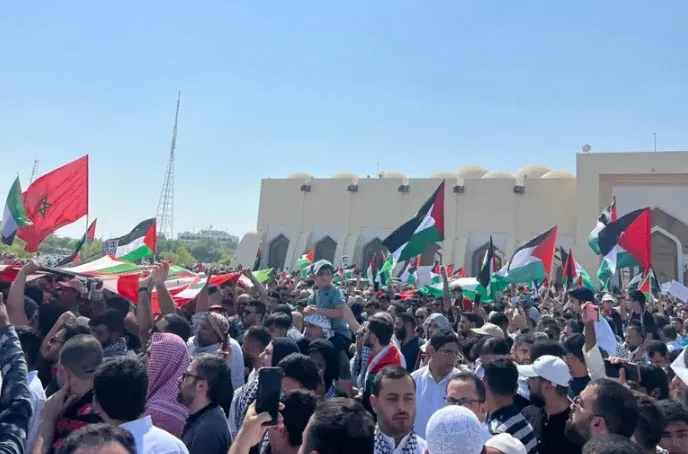An analysis of the Arab street's position on the war in Gaza
A survey of 8,000 Arab respondents to a sample of 8,000 people from 2023/12/12 to 2024/1/5 on trends in Arab public and official attitudes towards Israel's aggression conducted by the Arab Center for Research and Policy Studies over the phone revealed a wide discrepancy between official and popular attitudes in the Arab world and many trends regarding what is happening in Gaza.

A survey of 8,000 Arab respondents to a sample of 8,000 people from 2023/12/12 to 2024/1/5 on trends in Arab public and official attitudes towards Israel's aggression conducted by the Arab Center for Research and Policy Studies over the phone revealed a wide discrepancy between official and popular attitudes in the Arab world and many trends regarding what is happening in Gaza.
The survey was conducted in all Arab countries except the UAE, Bahrain, Djibouti, Somalia, and Syria, as well as the Gaza Strip.
The poll showed that the overwhelming majority of the Arab street refuses to recognize Israel by up to 89%, and therefore disapproves of the normalization to which some Arab regimes are heading.
The Arab street also believes that the negativity of Arab governments and normalization agreements are factors that encourage the occupation to continue its aggression on the Gaza Strip, according to the poll.
The results of the survey revealed the great confidence of the Arab street in the Palestinian resistance and its credibility, proposition and positions.
Defending Al-Aqsa
When asked about the reasons that led the Islamic Resistance Movement (Hamas) to carry out the Al-Aqsa Flood operation, the two reasons that led the list according to the respondents were the continuation of the occupation by 35%, and the defense of Al-Aqsa by 24%, which Hamas military operation named after.
The claim of the anti-resistance media - whether Arab, Israeli, or Western - that the Al-Aqsa Flood was the implementation of a foreign agenda, specifically the Iranian one, was only approved by 2% of the respondents.
"The highest rate of 45 percent who took up the defense of Al-Aqsa as the main reason for the Hamas attack came from the West Bank, reflecting residents' sense of danger to Al-Aqsa, whom they live with daily, and their high confidence in Hamas's credibility."
legitimate resistance
In assessing the legitimacy of Hamas's launch of the Al-Aqsa Flood, 88% of the Arab street saw it as legitimate resistance, while only 5% thought it was not.
The condemnation of the Hamas operation by some Arab regimes was contrary to the pulse and attitudes of the Arab street and certainly reflects the absence of democracy from Arab political decisions.
82% of respondents said Hamas was different from the Islamic State, and 10% said they did not know or refused.
For solidarity with Gazans and Hamas together, the figure was 69%, while 23% were in solidarity with Gazans who differed with Hamas.
No peace with occupation
The Israeli aggression shook the Arab street with its conviction of the possibility of establishing peace with the occupation, and 59% of the respondents felt that they had become certain that there would be no possibility of peace with the occupation, while 14% became very suspicious, and 9% believed even before the war that there was no possibility of peace, briefly, 82% of the Arab street did not see the possibility of peace with Israel, albeit to varying degrees.
This outcome reinforces the thesis of resistance in a large and sweeping way, and it necessarily shows the weak popularity of the Palestinian Authority and the conviction of Arab opinion of the futility of Arab peace initiatives with the occupation.
The results of the referendum sent a clear and clear message of anger to the West, especially the United States, for its support of the occupation crimes, and showed the weakness of American credibility in the Arab street. According to 50% of the respondents, American support is the most important factor contributing to the continuation of Israel's aggression on Gaza.
American Position
As for attitudes towards Israel's war on Gaza, 94% of respondents rated the US position as negative, while 79%, 78% and 75% rated the French, British and German positions, respectively, as negative.
While we notice that the percentage of those who are dissatisfied with the positions of European countries is close and high, we notice something like the consensus of the Arab street on the negative position of the United States.
Hatred of the Arab street and its negative feelings towards the United States of America have increased a lot, as have feelings of mistrust and lack of credibility in it. The vast majority of the respondents (81%) do not trust Washington's seriousness in working to establish a Palestinian state.
Mistrust of the US was withdrawn to include American media coverage of the war, which 82% of respondents rated as biased in favor of Israel.
What is striking is the Arab street's view that America is the most threatening to the region's security and stability (51%), far ahead of Israel (26%).
Central Issue
The Al-Aqsa Flood Operation re-launched the Palestinian cause after becoming a routine news item in past years, and returned to the forefront of issues in the Arab conscience, with 92% of respondents considering the Palestinian cause as the issue of all Arabs.
An overwhelming percentage of respondents also showed an active follow-up to the war on Gaza and psychological pressure on the Arab citizen as he pursued the aggression and war of annihilation against Gaza.
It was clear that the popular Arab position is almost unified in its positions on Palestine and the resistance, despite the great differences between the positions of the Arab regimes on these issues. Had the peoples had the freedom of choice and decision, the occupation and its crimes would have been dealt with in a different way than what is happening now.
Source: Al-Jazeera











